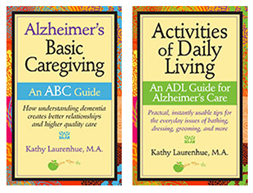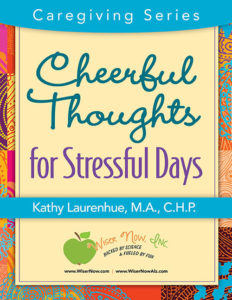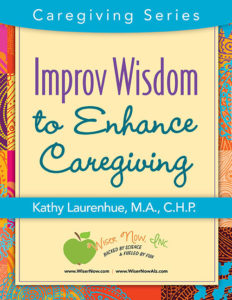Dementia Specific
Let’s start with terminology. Words to use and words to reject.
Terminology:
 Care partner, caregiver, care receiver: These terms imply roles that may or may not apply to how you see yourself. Some people see “care partner” as a neutral term that suggests we are all both givers and receivers, and to some extent that is true. Nevertheless, the reality is that in many situations, it’s a distinctly unequal partnership where the greater giver finds it hard to call it a partnership. Other English-speaking countries use the term “carer” in place of caregiver, which I like because really, it can be applied to anyone who cares for/about anyone in any of the above roles.
Care partner, caregiver, care receiver: These terms imply roles that may or may not apply to how you see yourself. Some people see “care partner” as a neutral term that suggests we are all both givers and receivers, and to some extent that is true. Nevertheless, the reality is that in many situations, it’s a distinctly unequal partnership where the greater giver finds it hard to call it a partnership. Other English-speaking countries use the term “carer” in place of caregiver, which I like because really, it can be applied to anyone who cares for/about anyone in any of the above roles.
Dementia: This is the umbrella term for any progressive disorder that causes loss of multiple brain functions. People have a tendency to think it is solely about memory loss and a general confusion, but it can include many other symptoms, such as deficits in judgment and reasoning, communication/language difficulties, disorientation, losses related to time and numbers, and much more. The four most common forms of dementia are Alzheimer’s disease, Dementia with Lewy Bodies (DLB), Vascular dementia, and Frontotemporal dementia, but there are many more, including variations of these.
A few sample words I reject entirely:
Behaviors (usually accompanied by the word “difficult”): When people can no longer verbally express their needs due, for example, to dementia or a stroke, they express them through their behavior or their demeanor, so “behaviors” are non-verbal expressions. It’s up to us to decipher the meaning of those expressions.
Suffer: This is a word I reject simply because it’s a downer and implies victimhood that serves no useful purpose, especially when used to describe the experience of others: “He suffers from ____.” It negates the joy that is still possible in the midst of dire circumstances.
Sundowning: This is a term I have railed against for decades. If sundowning refers to fading late in the afternoon after a long day when “doing our best” has taken a toll, then we ALL sundown. We’re tired, maybe crabby, and we crave some peace and quiet. It is not bizarre behavior that deserves a demeaning label.
Wandering: This is another term generally used to describe what is seen as purposeless behavior. As I explain more thoroughly in my book, Alzheimer’s Basic Caregiving, there are many logical reasons a person may be walking about, even if he can’t verbally express them. C’mon, don’t try to tell me you have never walked into a room and forgotten why. On the other hand, what if we called it “going for a stroll”? Doesn’t that sound more positive?
Cultivating a positive mindset.
 Attitude matters. My chosen superpower is cheerfulness, and I advocate adapting it to your own life. A positive attitude doesn’t deny the awfulness of any given disease, but it approaches the journey with curiosity, an open mind, and a willingness to go with the flow. Cheerfulness has two definitions: to BE in bright spirits and to PROMOTE bright spirits in others.
Attitude matters. My chosen superpower is cheerfulness, and I advocate adapting it to your own life. A positive attitude doesn’t deny the awfulness of any given disease, but it approaches the journey with curiosity, an open mind, and a willingness to go with the flow. Cheerfulness has two definitions: to BE in bright spirits and to PROMOTE bright spirits in others.
I do not always succeed at either definition of cheerfulness, because other authentic feelings get in the way. Cheerfulness is a worthy goal, but does not mean you can’t have down days or rail against whatever you are facing. Do not “should on” yourself. When you are crabby in spite of your best intentions or make a decision that doesn’t work out well, go easy on yourself. It may be true that you could have done something different, but it serves no useful purpose to say you should have done something different, because there is no guarantee that the outcome would have been better.
Someone once described dementia as a disease of soft agonies – continuous assaults to the ego, brought on by more and more things one can no longer do. But it can also be an assault to the carer’s ego when what worked before no longer works.  My other life goal besides cheerfulness is to be kind. It’s easier to be cheerful when you are kind to yourself. (See that section in Informal Caregivers.)
My other life goal besides cheerfulness is to be kind. It’s easier to be cheerful when you are kind to yourself. (See that section in Informal Caregivers.)
It’s also easier to be kind to yourself and others when you keep your sense of humor, so visit that section, too. Personally, I cannot tell jokes, and I’m not as successful in my attempts to be funny as I aim to be, yet I try to bring a cheery can-do attitude to each day. You can, too.
I’m not happy; I’m cheerful. There’s a difference.
A happy woman has no cares at all.
A cheerful woman has cares, but has learned how to deal with them.
~ Beverly Sills
Some of the time.
But you also need knowledge.
I applaud your loving heart and your determination to do your best in whatever role you are playing, but you also need to know what to do. The resources below were chosen to give you quality guidelines, while acknowledging you need material that is easy to absorb and take action on. None of them will overwhelm you, and I hope you find that they all encourage a can-do attitude.
 I have written two upbeat, practical books on caring for someone living with dementia that provide family and professional carers palatable and compassionate advice and answers that can be instantly put to use. Both are available in print, audio, and Kindle formats. The main topics covered in Alzheimer’s Basic Caregiving are common forms of dementia, patterns of progression, the logic behind behavioral expressions, and effective communication. Its companion book, Activities of Daily Living, covers the daily issues of dressing, bathing, grooming, continence care, nutrition and hydration. Learn more here.
I have written two upbeat, practical books on caring for someone living with dementia that provide family and professional carers palatable and compassionate advice and answers that can be instantly put to use. Both are available in print, audio, and Kindle formats. The main topics covered in Alzheimer’s Basic Caregiving are common forms of dementia, patterns of progression, the logic behind behavioral expressions, and effective communication. Its companion book, Activities of Daily Living, covers the daily issues of dressing, bathing, grooming, continence care, nutrition and hydration. Learn more here. I have written a number of booklets, two of which especially address the needs of carers. Cheerful Thoughts for Stressful Days is a terrific pick-me-up for down days. It provides keys for tapping into your emotional intelligence with more than a dollop of humor. Sure to make you and others smile. Order the downloadable booklet here for only $3.
I have written a number of booklets, two of which especially address the needs of carers. Cheerful Thoughts for Stressful Days is a terrific pick-me-up for down days. It provides keys for tapping into your emotional intelligence with more than a dollop of humor. Sure to make you and others smile. Order the downloadable booklet here for only $3. Improv Wisdom – This downloadable $3 booklet, which takes its name from Patricia Madson’s book, Improv Wisdom, and has her endorsement, adapts the principles of improvisational theatre and applies them to caregiving. Its practical tips will also make you smile. A terrific training resource, too.
Improv Wisdom – This downloadable $3 booklet, which takes its name from Patricia Madson’s book, Improv Wisdom, and has her endorsement, adapts the principles of improvisational theatre and applies them to caregiving. Its practical tips will also make you smile. A terrific training resource, too.- Two of the articles currently on this site directly address issues related to dementia care: “Improv Principles Improve Communication, Too,” and “Communication: 2 Simple Rules.” One other is aimed at helping to encourage people to exercise by making it more interesting: “Add Beauty to Exercise.” Access them all here.
- You will find additional resources by going to “Resources” on the menu bar and lots of activity materials on my other two primary websites, WiserNow.com and CreatingDelight.com.
All of the above will inform your caregiving for someone living with dementia, but a cheerful attitude can only be maintained when you eat well, sleep well, and take care of your own needs. An old Irish proverb says, “A good laugh and a long sleep are the best cures.” Be good to yourself, and check out the humor resources.
Join Our Free Mail List
to get immediate access to a matching quiz on amusing quotes by George Carlin and Yogi Berra, plus monthly uplifting, brain-stimulating exercises — trivia quizzes, word games and more.
“Wait Lifters is a whimsical, fun and engaging newsletter that provides you with all the resources needed to present new challenges, entertainment and inspiration to your residents. What a great way to strengthen your brain and form relationships!”
~ Brenda Richy, National Director of Resident Engagement, Solstice Senior Living
◊ ◊ ◊ ◊ ◊
“I love love love your newsletter and site. Keep up the good work.”
~ Felicia Porambo, Activity Director, Maple Shade Meadows
